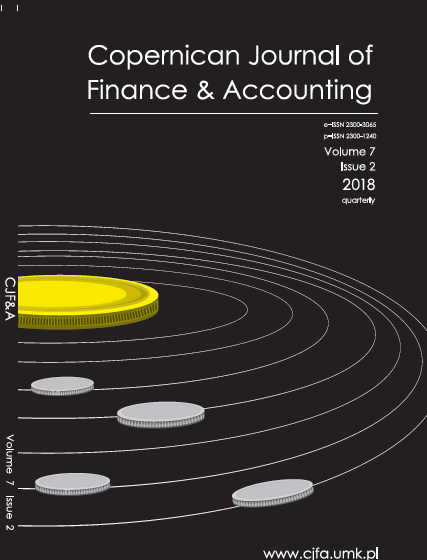MANAGING SOLID URBAN WASTE IN ITALY: AN ECONOMIC, FINANCIAL, AND ENVIRONMENTAL PERFORMANCE ANALYSIS
DOI:
https://doi.org/10.12775/CJFA.2018.006Słowa kluczowe
waste management, separate waste collection, performance analysis, ItalyAbstrakt
The present article focuses on Italian solid urban waste management companies in the aim of ascertaining whether the best practices in this field, and specifically regarding separated waste collection (paper, plastic, glass, organic compostable, and non-recyclable waste), are sufficiently widespread as per European Union directives relative to the circular economy. In addition to this analysis, the paper also evaluates the financial performance of a companies’ group which should operate economically to guarantee continuity of management and provision of services to the community at large. The analysis concerns companies operating in approximately 900 municipalities located throughout the Italian territory. The results show a quite variegated situation, in which the northern regions appear to represent the macro-area where the most efficient firms operate, realizing the highest level of separated waste collection despite having the lowest unitary revenues, both per ton collected and per inhabitant served.Bibliografia
Bartolacci, F., Paolini, A., Quaranta, A.G., & Soverchia, M. (2018). The relationship between good environmental practices and financial performance: evidence from Italian waste management companies. Sustainable Production and Consumption, 14(2), 129–135. http://dx.doi.org/10.1016/j.spc.2018.02.002.
Bognetti, G., & Robotti, L. (2003). The reform of local public utilities in Italy. Annals of Public and Cooperative Economics, 74(1), 117–137. http://dx.doi.org/10.1111/1467-8292.00218.
Citroni, G., Lippi, A., & Profeti, S. (2016). Local public services in Italy: still fragmentation. In H. Wollmann, I. Koprić, G. Marcou (Eds.). Public and Social Services in Europe. From Public and Municipal to Private Sector Provision. Berlin: Springer.
Cossu, R., & Williams, I.D. (2015). Urban mining: concepts, terminology, challenges. Waste Management, 45, 1–3. http://dx.doi.org/10.1016/j.wasman.2015.09.040.
European Commission (2015). Closing the loop. An EU action plan for the Circular Economy. COM(2015) 614 final, Brussels.
European Parliament (2017). Circular economy package. Four legislative proposals on waste. Brussels.
Gharfalkar, M., Court, R., Campbell, C., Ali, Z., & Hillier, G. (2015). Analysis of waste hierarchy in the European waste directive 2008/98/EC. Waste Management, 39, 305–313. http://dx.doi.org/10.1016/j.wasman.2015.02.007.
Greco, G., Allegrini, M., Del Lungo, C., Gori Savellini, P. & Gabellini, L. (2015). Drivers of solid waste collection costs. Empirical evidence from Italy. Journal of Cleaner Production, 106, 364–371. http://dx.doi.org/10.1016/j.jclepro.2014.07.011.
Hart, S.L., & Ahuja, G. (1996). Does it pay to be green? An empirical examination of the relationship between emission reduction and firm performance. Business Strategy and the Environment, 5(1), 30–37. http://dx.doi.org/10.1002/(SICI)1099-0836(199603)5:1<30.
Higgins, R. (2012). Analysis for Financial Management: Tenth edition. New York: McGraw-Hill.
Horváthová, E. (2012). The impact of environmental performance on firm performance: Short-term costs and long-term benefits? Ecological Economics, 84, 91–97. http://dx.doi.org/10.1016/j.ecolecon.2012.10.001.
Italian Competition Autority (2016). Indagine conoscitiva sui rifiuti solidi urbani (Factfinding survey on solid urban waste). Rome.
Judge, W.Q., & Douglas, T.J. (1998). Performance implications of incorporating natural environmental issues into the strategic planning process: an empirical assessment. Journal of Management Studies, 35, 241–262. http://dx.doi.org/10.1111/1467-6486.00092.
Khanna, M., & Damon, L.A. (1999). EPA's Voluntary 33/50 Program: Impact on Toxic Releases and Economic Performance of Firms. Journal of Environmental Economics and Management, 37(1), 1–25. http:// dx.doi.org/10.1006/jeem.1998.1057.
Koushki Parviz, A., Al-Duaij, U., & Al-Ghimlas, W. (2004). Collection and transportation cost of household solid waste in Kuwait. Waste Management, 24(9), 957–964. http://dx.doi.org/10.1016/j.wasman.2004.03.013.
Listowski, A., Ngo, H.H., & Guo, W.S. (2013). Establishment of an economic evaluation model for urban recycled water. Resources, Conservation and Recycling, 72, 67–75. http://dx.doi.org/ 10.1016/j.resconrec.2012.12.011.
Lohri, C.R., Camenzind, E.J., & Zurbrügg, C. (2014). Financial sustainability in municipal solid waste management – Costs and revenues in Bahir Dar, Ethiopia. Waste Management, 34(2), 542–552. http://dx.doi.org/10.1016/j.wasman.2013.10.014.
Macpherson, M. (2001). Performance measurement in not‐for‐profit and public‐sector organizations. Measuring Business Excellence, 5(2), 13–17. http://dx.doi.org/10.1108/13683040110397220.
Nishitania, K., Jannah, N., Kaneko, S., & Hardinsyah (2017). Does corporate environmental performance enhance financial performance? An empirical study of indonesian firms. Environmental Development, 23, 10–21. http://dx.doi.org/10.1016/j.envdev.2017.06.003.
Pollit, C., & Bouckaert, G. (2011). Public management reform. Oxford: Oxford University.
Qi, G.Y., Zeng, S.X., Shi, J.J., Meng, X.H., Lin, H., & Yang, Q.X. (2014). Revisiting the relationship between environmental and financial performance in Chinese industry. Journal of Environmental Management, 145, 349–356. http://dx.doi.org/10.1016/j.jenvman.2014.07.010.
Rubio-Romero, J.C., Arjona-Jiménez, R., & López-Arquillosa, A. (2013). Profitability analysis of biogas recovery in Municipal Solid Waste landfills. Journal of Cleaner Production, 55(15), 84–91. http://dx.doi.org/10.1016/j.jclepro.2012.12.024.
Sargiacomo, M. (2013). Public Sector Management in Italy. Milan: McGraw-Hill.
Song, H., Zhao, C., & Zeng, J. (2017). Can environmental management improve financial performance: An empirical study of A-shares listed companies in China. Journal of Cleaner Production, 141, 1051–1056. http://dx.doi.org/10.1016/j.jclepro.2016.09.105.
Symbola (2015). Waste end. Economia circolare, nuove frontiera del made in Italy (Waste end. Circular economy, new border for made in Italy). Rome: Symbola Foundation.
Tisserant, A., Pauliuk, S., Merciai, S., Schmidt, J., Fry, J., Wood, R., & Tukker, A. (2017). Solid waste and the circular economy – a global analysis of waste treatment and waste footprints. Journal of Industrial Ecology, 21(3), 628–640. http://dx.doi.org/10.1111/jiec.12562.
Utilitatis (2016). Green Book. Rome.
Velenturf, A.P.M., & Purnell, P. (2017). Resource recovery from waste: restoring the balance between resource scarcity and waste overload. Sustainability, 9(9), 1–17. http://dx.doi.org/10.3390/su9091603.
Pobrania
Opublikowane
Jak cytować
Numer
Dział
Statystyki
Liczba wyświetleń i pobrań: 836
Liczba cytowań: 0



